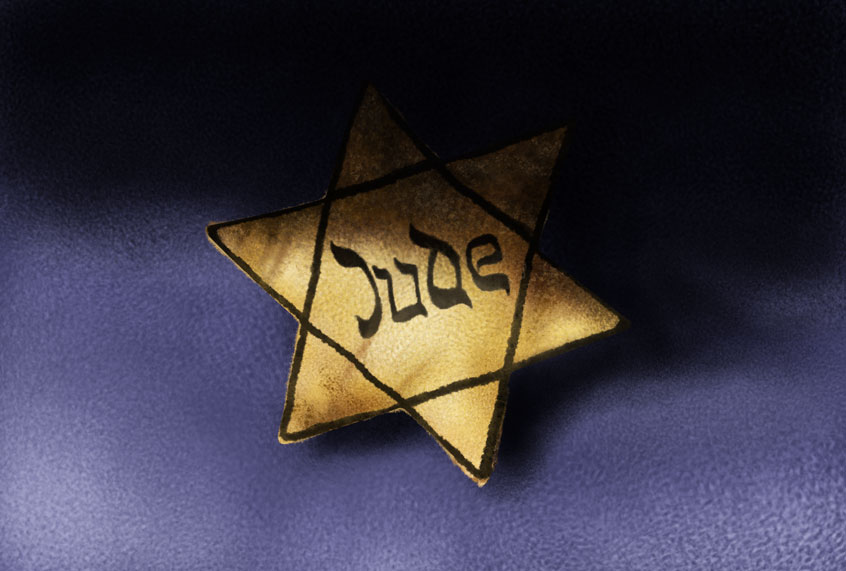Growing up in Brooklyn in the ‘80s and ‘90s, the Holocaust felt distant somehow, even when bringing my great-grandmother’s yellow star to fourth grade show-and-tell, even as it dangled from my Hebrew teacher’s fingertips as she said, “I can’t believe I’m holding this.” My great-grandparents and grandparents survived the Shoah in Romania and Hungary, where it seemed locals were particularly eager to be rid of their Jewish neighbors. Nazi officials complained their Romanian counterparts were barbaric, lacking order. My family didn’t leave Romania until the 1970s, when it was clear there was no future for Jews. But I felt protected. We were far away from all that, in geographic distance and time.
But something shifted after 9/11, then shifted again with the 2003 invasion of Iraq.
I was in college. I’d just learned about Argentina’s Dirty War (1976-1983) — not in a history class but obliquely, in Anne Carson’s novel-in-verse “Autobiography of Red.” I dove into independent research, trying to understand. The recent history shocked me: up to 30,000 people were “disappeared” by the right-wing military dictatorship for even the slightest suspicion of dissent. It sounded too much like the Holocaust: Jews disproportionately targeted, arrests, detention camps, mass murders and many looking away or welcoming “order,” trying to justify atrocity with the phrase, it must be for something.
Overlaid with this new understanding of history repeating itself was the dread-inducing rhetoric of the War on Terror. I wondered how far our government would go in the name of this nebulous crusade. How many civil rights would be trampled? I didn’t think I’d be looping back upon these thoughts in 2017 with greater urgency. I didn’t think George W. Bush would be thought of with nostalgia for gentler times.
Seedlings for my first novel began sprouting between 2001 and 2003. The Argentinean family which emerged in “Daughters of the Air” resembled my own in one regard: Jew-ish. Not particularly observant. If you looked, maybe you wouldn’t necessarily know. The father in my novel is a sociology professor at a public university, a prime leftist target for the right-wing junta, alongside journalists, lawyers and students. It doesn’t help that he’s Jewish. Observance and assimilation have nothing to do with it. It’s not about faith, it’s about blood. The Nazis didn’t care. Nor did the junta. And the connection between the two is fairly clear: prisoners were forced to listen to recordings of Hitler’s speeches at a high volume. This on top of the beatings, rapes, electrocutions, mutilations, lying in your own filth with a sack on your head. Sacks on heads sound familiar.
Whatever we “learned” about the Holocaust we hadn’t learned enough, apparently. We seemed to be forgetting. So the novel evolved into a Holocaust novel without reference to the Holocaust. Perhaps it’s just as well, if readers have been dulled by “Holocaust fatigue.” Indeed, in 2010, a writer at a conference told me she wished people would just stop writing about the Holocaust because it was “overdone.”
Earlier that year in a workshop, Jonathan Raban pointed out an image in a chapter draft which showed the mother and daughter in my novel perched on suitcases, waiting to change planes in Belém. They’d fled Buenos Aires early in the morning. The image of refugees in transit perched on suitcases brought to mind the Holocaust, but he thought it wise not to explicitly mention the Holocaust. Even though I agreed with him, I wish I’d asked him why. But I made an assumption. Being explicit seemed ham-handed. When I heard the overdone comment at the conference, I thought: Well, maybe that’s what I’m doing, then. I’m sneaking it in.
I thought about the difficulty of escape. The difficulty in trusting others not to turn you in. The bureaucratic nightmare that shielded systematic torture and murder. I thought about the horrific mystery of disappearance.
In Romania, in World War II, my grandfather, 17 years old at the time, was imprisoned for distributing anti-fascist pamphlets on a street corner. His older brother died when he “fell” from a moving train. Emotionally, there was a doubling for me, trying to understand the pain of not knowing what really happened, trying to understand the terror of being thrown. In the instance of the Dirty War, being thrown from a plane. For having a political view different from the one in power? Or even just the mere suspicion of difference? For being Jewish? No trial. No process. We see the threat of gross violations of human rights in many countries; it’s an exhausting vigil; no wonder people look away. The threat, increasingly, includes our own.
The novel became, for me, a hypersensitive instrument, an alarm bell to remain vigilant, a tool for active memory.
Have you ever played the Anne Frank game? The one where you decide which non-Jewish friends to trust in the event of a second Holocaust? That’s the premise of Nathan Englander’s 2012 story “What We Talk About When We Talk About Anne Frank,” set in contemporary South Florida, in which two married couples get high and ponder their options. When Donald Trump won the Electoral College, my husband and I couldn’t help but have that discussion.


